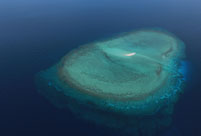

Australian scientists on Thursday described the breaking-off of a one-trillion-ton iceberg from Antarctica as "deeply troubling."
The Larsen C shelf, measuring 5,800 square kilometers, broke away from Antarctica between July 10 and July 12, scientists in the United Kingdom (UK) confirmed on Wednesday.
It was the third such incident in the part of Antarctica closest to South America after the Larsen A and B shelves collapsed in 1995 and 2002, respectively.
Nathan Bindoff, head of the Oceans and Cryosphere Program at the Institute of Marine and Antarctic Studies (IMAS), said that the break-away would accelerate the thinning of ice in Antarctica, meaning more breakaways are imminent.
"Big icebergs breaking off the major ice-shelves are a critical component of the story around the fate of the Antarctic Ice Sheet," Bindoff said in a statement obtained by Xinhua on Thursday.
"The ice shelves buttress the Antarctic Ice Sheet and slow the rate of ice loss from Antarctica. So a major iceberg like this one means we will see an acceleration of the grounded glaciers behind the Larsen C shelf.
"Amazingly, this glacier acceleration will contribute to further sea-level rise in next few years. We saw precisely this behavior for sea-level when the Larsen B ice shelf broke up."
Despite the collapse being a natural process, Ian Simmonds, a professor at the School of Earth Sciences at the University of Melbourne, said man-made global warming had accelerated the process.
"The calving of this huge iceberg from the Larsen C ice shelf is deeply troubling. This follows the collapse of part of the Larsen B ice shelf in February 2002," Simmonds said.
"The causes of these breakups are similar. Temperatures have risen dramatically in the region over recent decades. This has meant that summer temperatures now frequently get above freezing, and the associated surface melting significantly weakens the ice shelves."
 Magnificent view of Nansha Islands in South China Sea
Magnificent view of Nansha Islands in South China Sea Aerial view shows scenery in Hong Kong
Aerial view shows scenery in Hong Kong China builds world’s first offshore fish farm
China builds world’s first offshore fish farm A Foreigner's Chinese Dream and Love for China
A Foreigner's Chinese Dream and Love for China 5,000-year-old Chinese beer recipe goes down a storm in US
5,000-year-old Chinese beer recipe goes down a storm in US World's first driverless rail transit system unveiled in Hunan
World's first driverless rail transit system unveiled in Hunan World's largest cluster of Miao villages in Guizhou
World's largest cluster of Miao villages in Guizhou Daily life in Kashgar, China's Xinjiang
Daily life in Kashgar, China's Xinjiang Top 10 Chinese tech and engineering marvels
Top 10 Chinese tech and engineering marvels Top 10 most sustainable cities in China
Top 10 most sustainable cities in China Top 10 European patent applicants in 2016
Top 10 European patent applicants in 2016 The power of 'She' in China
The power of 'She' in China Seven most beautiful art museums in China
Seven most beautiful art museums in China China’s law, doctors decide Liu Xiaobo’s treatment
China’s law, doctors decide Liu Xiaobo’s treatment Village known for exporting replicas of van Gogh, Dali repaints itself as original brand
Village known for exporting replicas of van Gogh, Dali repaints itself as original brand  Schools making students apply to top colleges to pass local govt tests
Schools making students apply to top colleges to pass local govt tests Mini-KTV: A No.1 Hit
Mini-KTV: A No.1 Hit Day|Week